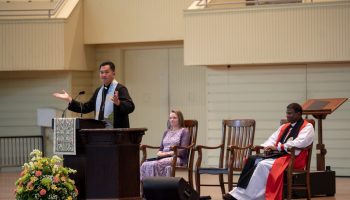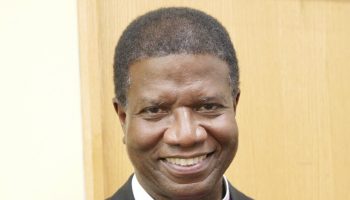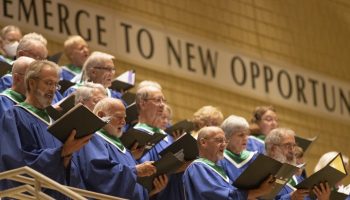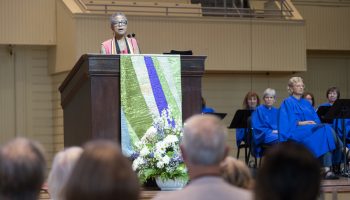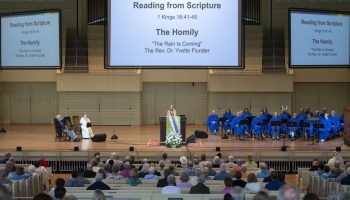“Every now and then, giants show up in our lives,” said the Rev. Traci deVon Blackmon. “They are uninvited and unexpected, but all of us face giants at one time or another.”
On Friday, July 10, Blackmon preached at the 9:15 a.m. EDT morning devotional on the CHQ Assembly Video Platform. Her sermon title was “You Might As Well Throw The Rock.” The scripture text was 1 Samuel 17:49-50 (NRSV):
“David put his hand in his bag, took out a stone, slung it, and struck the Philistine on his forehead; the stone sank into his forehead, and he fell face down on the ground. So David prevailed over the Philistine with a sling and a stone, striking down the Philistine and killing him; there was no sword in David’s hand.”
“Giants show up in private and public, the board room and sick room, at our jobs and in our homes, in the court house and the White House,” Blackmon said. “They are equal opportunity employers and they don’t care where you are.”
David was a special young man, anointed king at age 15 but not appointed king until he was 30.
“Sometimes God needs time to mature us and develop us,” she said. The worst position for a person to be in is when their charisma takes them to a place their character cannot sustain.
People had low expectations for David. His father, Jesse, placed all his other sons before the prophet Samuel to anoint as king, but did not bring David in because he “did not have the stature.”
“God always looks at the heart,” Blackmon said. “Have you ever had someone underestimate the God in you? David reminds us that what ultimately matters is that we are called by God.”
David was being forged for his destiny. His character, commitment and compassion were being tested and honed.
“He had a habit of talking to God at night while he was in the fields, and he could trust God to take care of him,” she said. In slaying a lion and a bear to protect the sheep, he matured and developed his courage before he led the people of Israel as king.
Saul was still the appointed king, but he was no longer the anointed king. “There is nothing worse than being in the position (of king) but having no power,” Blackmon said. “David, on the other hand, was anointed but not yet appointed.”
David’s brothers were fighting in Saul’s army against the Philistines. The army was in a standoff with them. “The Philistines had Goliath, who ran his mouth all day and tweeted all night. He was trying to intimidate the Israelites,” she said.
David was moved into an extraordinary position simply by bringing his brothers some lunch. “Sometimes in the smallest assignment, God learns to trust us,” Blackmon told the virtual congregation.
David saw Goliath and heard his taunts. David responded to the situation, saying, “‘Who is this uncircumcised Philistine to come against my God?’”
The difference between David and the stalled army was that David was studying God while the army was studying Goliath. “When we learn the moves of God, we can face giants because we have been studying God,” she said.
In these tense and turbulent times, she said, “We need to focus on God. David did not fear the giant because his faith was in God.”
She continued, “I did not come this far not to throw my rock. David had a slingshot and a stone, no sword or armor. He used what he had and threw the rock.”
When it is time to confront giants, “Say a prayer — ‘I will have the courage to throw my rock. I might as well stand for what is right even if I stand alone,’” Blackmon urged the congregation. “You might as well throw your rock, because God is on your side.”
The Rev. Carmen L. Perry, pastor of the Hurlbut Memorial Community United Methodist Church in Chautauqua Institution, presided from the Hall of Christ. Joshua Stafford, interim organist for Chautauqua Institution, played the Tallman Tracker Organ. Michael Miller, a Chautauqua Opera Apprentice Artist, served as vocal soloist. The organ prelude, performed by Stafford, was an improvisation. Miller sang the hymn, “Lift Every Voice and Sing,” by James Weldon Johnson and John Rosamond Johnson, often called the “Black National Anthem.” Stafford played an improvisation for the postlude. This program was made possible by the Mr. and Mrs. William Uhler Follansbee Memorial Chaplaincy and the Robert D. Campbell Memorial Chaplaincy Fund.


